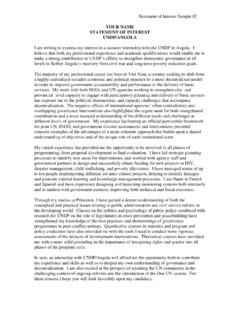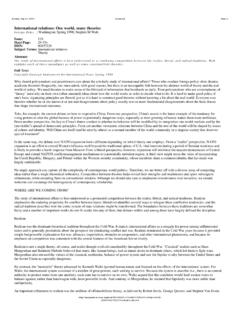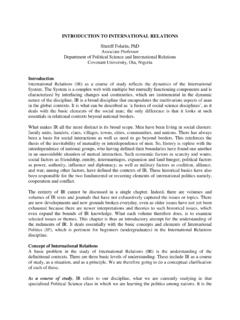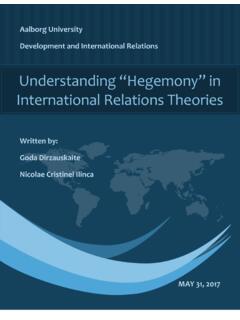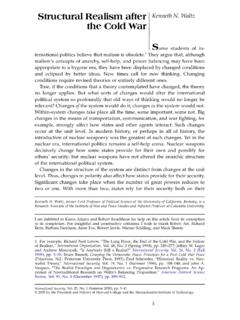Transcription of LIBERAL THEORIES OF INTERNATIONAL LAW
1 1 CN 4 CT LIBERAL THEORIES of INTERNATIONAL Law Andrew Moravcsik LIBERAL THEORIES of INTERNATIONAL relations (IR) focus on the demands of individuals and social groups, and their relative power in society, as fundamental forces driving state policy and, ultimately, world order. For liberals, every state is embedded in an interdependent domestic and transnational society that decisively shapes the basic purposes or interests that underlie its policies. This bottom-up focus of LIBERAL THEORIES on state society relations, interdependence, and preference formation has distinctive implications for understanding INTERNATIONAL law (IL). Accordingly, in recent years LIBERAL theory has been among the most rapidly expanding areas of positive and normative analysis of INTERNATIONAL law.
2 As the world grows more and more interdependent and countries struggle to maintain cooperation amidst diverse economic interests, domestic political institutions, and ideals of legitimate public order, INTERNATIONAL law will increasingly come to depend on the answers to questions that LIBERAL THEORIES pose. I am grateful to Chris Kendall and Justin Simeone for excellent research assistance and for stylistic and substantive input, and to William Burke-White, Jeffrey Dunoff, Laurence Helfer, Mark Pollack, Anne-Marie Slaughter, and participants at a conference at Temple University Beasley School of Law for detailed comments, To appear in: Jeffrey L.
3 Dunoff and Mark A. Pollack, eds., INTERNATIONAL Law and INTERNATIONAL Relations: The State of the Art (forthcoming, 2012). 2 The first section of this chapter ( LIBERAL THEORIES of INTERNATIONAL Relations ) elaborates the assumptions and conclusions of LIBERAL INTERNATIONAL relations theory. Section II ( What Can LIBERAL THEORIES Tell Us about INTERNATIONAL Law Making? ) develops LIBERAL insights into the substantive scope and depth of INTERNATIONAL law, its institutional form, compliance, and long-term dynamic processes of evolution and change. Section III ( INTERNATIONAL Tribunals: LIBERAL Analysis and Its Critics ) examines the specific case of INTERNATIONAL tribunals, which has been a particular focus of LIBERAL theorizing, and treats both conservative and constructivist criticisms of LIBERAL theory.
4 Section IV ( liberalism as Normative Theory ) considers the contribution of LIBERAL theory to policy, as well as to conceptual and normative, analyses of INTERNATIONAL law. A I. LIBERAL THEORIES of INTERNATIONAL Relations The central LIBERAL question about INTERNATIONAL law and politics is: who governs? Liberals assume that states are embedded in a transnational society comprised of individuals, social groups, and substate officials with varying assets, ideals and influence on state policy. The first stage in a LIBERAL explanation of politics is to identify and explain the preferences of relevant social and substate actors as a function of a structure of underlying social identities and interests.
5 Among these social and substate actors, a universal condition is globalization, understood as transnational interdependence, material or ideational, among social actors. It creates varying incentives for cross-border political regulation and interaction. State policy can facilitate, block, or channel globalization, thereby benefitting or harming the 3 interests or ideals of particular social actors. The state is a representative institution that aggregates and channels those interests according to their relative weight in society, ability to organize, and influence in political processes. In each state, political organization and institutions represent a different subset of social and substate actors, whose desired forms of social, cultural, and economic interdependence define the underlying concerns (preferences across states of the world ) that the state has at stake in INTERNATIONAL issues.
6 Representative functions of INTERNATIONAL organizations may have the same effect. The existence of social demands concerning globalization, translated into state preferences, is a necessary condition to motivate any purposeful foreign policy action. States may seek to shape and regulate interdependence. To the extent this creates externalities, positive or negative, for policy-makers in other states seeking to realize the preferences of their individuals and social groups, such preferences provides the underlying motivation for patterns of interstate conflict and cooperation. Colloquially, what states want shapes what they do. LIBERAL theory highlights three specific sources of variation in state preferences and, therefore, state behavior.
7 Each isolates a distinctive source of variation in the societal demands that drive state preferences regarding the regulation of globalization. To avoid simply ascribing policy changes to ad hoc or unexplained preference changes, LIBERAL theory seeks to isolate the causal mechanisms and antecedent conditions under which each functions. In each case, as the relevant 4 domestic and transnational social actors and contexts vary across space, time, and issues, so does the distribution of state preferences and policies. Ideational LIBERAL THEORIES attribute state behavior to interdependence among social demands to realize particular forms of public goods provision.
8 These demands are, in turn, based on conceptions of desirable cultural, political, and socioeconomic identity and order, which generally derive from both domestic and transnational socialization processes. Common examples in modern world politics include conceptions of national (or civic) identity and self-determination, fundamental political ideology (such as democratic capitalism, communism, or Islamic fundamentalism), basic views of how to regulate the economy (social welfare, public risk, environmental quality), and the balance of individual rights against collective duties. The starting point for an ideational LIBERAL analysis of world politics is the question: How does variation in ideals of desirable public goods provision shape individual and group demands for political regulation of globalization?
9 Commercial LIBERAL THEORIES link state behavior to material interdependence among societal actors with particular assets or ideals. In INTERNATIONAL political economy, conventional endogenous policy THEORIES of trade, finance, and environment posit actors with economic assets or objectives, the value of which depends on the actors position in domestic and global markets ( , patterns of globalization). The starting point for a commercial LIBERAL analysis of world politics is the question: How does variation in the assets and market position of economic actors shape their demands for political regulation of globalization? 5 Republican LIBERAL THEORIES stress the role of variation in political representation.
10 Liberals view all states (and, indirectly, INTERNATIONAL organizations) as mechanisms of political representation that privilege the interests of some societal actors over others in making state policy. Instruments of representation include formal representation, constitutional structure, informal institutional dynamics, appointment to government, and the organizational capacity of social actors. By changing the selectorate the individuals and groups who influence a policy the policy changes as well. The starting point for a republican LIBERAL analysis of world politics is the question: How does variation in the nature of domestic representation alter the selectorate, thus channeling specific social demands for the political regulation of globalization?

